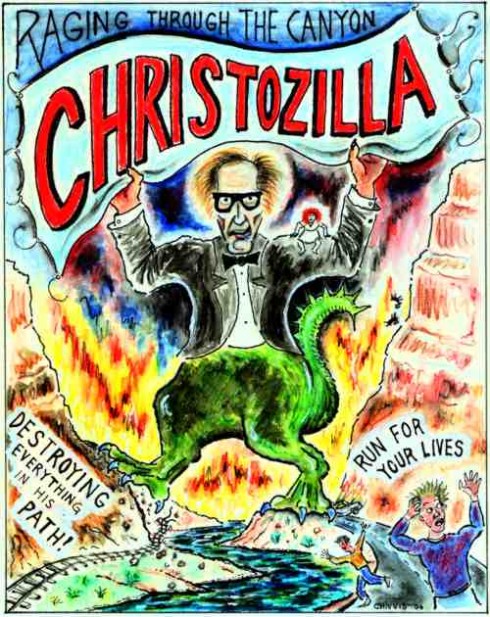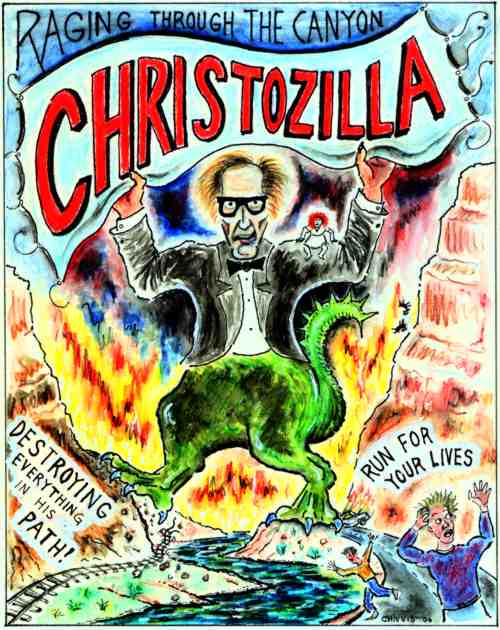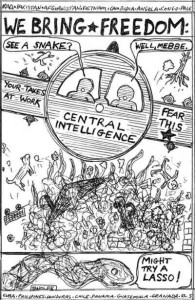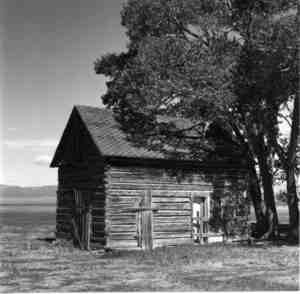Essay by Martha Quillen
Christo Project -March 2006 -Colorado Central Magazine
In case anyone hasn’t guessed, I’ve always liked writing research papers. Thus somewhere along the line I started approaching my Letters From the Editors like research projects. I would think of a topic, look it up on the Internet, go to the library and find some books about it, then read more articles, until finally I’d try to knit everything together into an essay, which generally had a couple of news stories and a book review or two stitched in. But this is the 21st century. Readers don’t have time for that. And I don’t have time for it, either.
Of course, in the old days, I would have written about that: “Why does it always seem like nobody has time for anything any more?”
And in that pursuit, I would have looked stuff up, and no doubt realized that other people have written tons about just that –starting way back with the Greeks, Romans and Egyptians. And since this is Colorado Central, I would feel obligated to tie old thoughts, new thoughts, national thoughts and international thoughts with ideas expressed in local newspapers, histories, radio shows, and conversations.
Hence my New Year’s resolution: Be brief. (Though brevity may not actually be the soul of wit, it’s quicker). Therefore, this month I thought I would write a Letter From the Editors that addresses what such letters usually do: the current issue.
Our lead article this month concerns the Over the River (OTR) project proposed by artists Christo and Jeanne-Claude. In September, we carried an OTR piece by Doris Dembosky, who is clearly a fan of the proposed project, and later we ran a press release from an OTR support group. This month we feature an article by a member of ROAR (for Rags Over the Arkansas River), an opposition group, and an essay by Deric Pamp, who favors the idea, but with some reservations.

However, Colorado Central has barely touched upon the subject compared to the rest of Salida –and apparently most of Fremont County. Everybody’s talking about it, and letters about Christo and Jeanne-Claude’s plans for the Arkansas have poured into the Mountain Mail. At this point, there seems to be more opposition than support, at least in the local newspaper. But there’s plenty of both, and the letter writers certainly don’t lack conviction. Some quotes:
“I have become increasingly appalled by this most inconsiderate ‘project.'”
Lynn Shank
“I believe the project will enhance our appreciation of the beauty of the Arkansas River and be of great benefit to our community.
“It will give us an opportunity to showcase the awesome geography of our land and the friendliness of our people to visitors from all over the world.”
Elizabeth Ritchie
“Dear Editor:
“Re: Abandoned stove removed from Arkansas River Tuesday.
“Hey! Why’d they do that? That stove was art, man!
“I bet the owner put it in the river because he believed it was art and probably expected it to float down the river and be in position to complement Christo hanging his underwear and tablecloths over the river.”
Jeffrey S. Blondeau
“It will be a privilege to have Christo and Jeanne-Claude come to our part of the world to realize and celebrate ‘Over the River.’
“We are fortunate to have this once-in-a-lifetime opportunity.”
Sally and J-M Lacroux
“I would have tons and tons of respect for Christo if he took his money, his fabric and his engineers to Afghanistan and created Tents that would help keep Afghan earthquake victims from freezing to death this winter.”
Lisa Dolby
“For the second time in less than a month we hear the naysayers imagining the worst of all possible events simultaneously descending upon them as the Christo project moves forward….
“…. I prefer wonderment, awe, inspiration and joy to ‘doom and gloom.’ Life is too short to feel otherwise.”
Greg Mihalik
“This plot to trash our beautiful canyon should have been squelched from the get-go!”
Marge and Darrell Boysen
“Lastly, to me, viewing art should be a choice not a requirement….
“I do not force Jeanne-Claude and Christo to view my art, so why do they think they have a right to force their art on me?”
Susan Brown
For the most part, I’ve refused to think about Over the River. It seemed a safe enough thing to avoid while Christo and Jeanne-Claude were off installing Gates in New York City. And even after that, they were talking years: at least two or three to get started, and eight or nine to finish.
And the artists aren’t young, so….
I guess I just hoped it would never happen. Mostly, I suppose I hoped our community would never get around to even arguing about OTR.
I have several friends who support the project, but still claim that they just don’t get it. “What do people see in this stuff?” they ask.
And I always wonder why they’re asking me. But I guess I do get it. Something can be temporary, unnatural, and perhaps even on the silly-and-unnecessary side, and still prove amazing or even life-transforming.
Don’t take my word for it, though. Consider Leadville’s Ice Palace. It was an elaborate emporium and skating rink sculpted out of ice, and it cost a fortune. It was supposed to last a year or more, but melted prematurely, along with the community’s hope of ever recouping their investment. Yet more than a century later, people still talk about it. And people used to flock to World’s Fairs where the attractions were monumentally excessive: exhibition halls, parks, gardens, fountains, statuary, and even gas and electric lights before there were lights anywhere else; plus the Crystal Palace, Eiffel Tower, Atomium, Unisphere, and Space Needle.
When you come right down to it, the Statue of Liberty, Sphinx, Washington Monument, and Arc de Triomphe are not all that practical, either. But they are memorable. And I suppose that’s what Christo and Jeanne-Claude are trying to create, something different, unique, and memorable.
Furthermore, I can imagine that their panels over the Arkansas might be truly spectacular –moving, rippling, and filtering light. Look at Christo’s illustrations and imagine sitting on the river bank watching the water flow under those giant colored draperies. It could be awe-inspiring.
But with that said, I should admit that if the traffic is nearly as bad as it is on a summer Sunday when there’s too much road construction, I will probably skip the experience. The truth is, I’m not thrilled with Over the River. I like my giant, gaudy artworks a comfortable distance away, where I can visit them and then go home and escape the crowds.
Likewise, I really hate the idea of inviting hundreds of thousands of people into Central Colorado. What are we going to do with them when they get here? Sell them real estate? Hand them property listings to take home?
People come here (or stay here) because they like small towns, rural places, and open spaces. But then we keep wanting to bring in more stuff. Thus, someday we will probably end up living in a traffic-burdened, overdeveloped suburb of our own making –until we move on to another undeveloped place. And once there, we will no doubt lobby for bigger and better grocery stores, discount stores, homes, golf courses, hospitals, clinics, theaters, and office buildings. (Or we’ll build houses, start magazines, wait on second-home owners, fence in newly subdivided pastures, and manufacture sportswear and kayak paddles because we need to make a living.) And thus our new community will eventually turn into an overcrowded suburb, too.
In our culture, progress and growth are synonymous. In fact, we don’t seem to know how to sustain ourselves any other way.
When it comes to Over the River, there’s a lot of denial on both sides. The proponents spurn the idea that anything could go wrong, when it obviously could. It’s not a small thing to invite tens of thousands of people into a community that couldn’t possibly house and feed such a crowd. We’re talking lots of people, a narrow highway; a river packed with rafts and kayaks –and an untested engineering project. Something could go wrong.
Or things could go extremely well. Everyone I’ve met who’s seen a Christo/Jeanne Claude project loved it. So once up, perhaps even the opponents will be surprised and amazed.
But I keep wondering about the future.
Malcolm Gladwell’s book, The Tipping Point, speculates about that point when something becomes so popular that there’s no stopping it. It doesn’t matter what it is –fashions, hula hoops, Muppets, Crocs, Care Bears –at a certain point it takes off like an epidemic and gets really big overnight.
For a long time, people in our community have been worrying about whether that could happen here. A lot of us fret that someday we’ll turn around, and they’ll be building Wendys, Chilis, Outbacks, Starbucks, American Furniture Warehouses, and Home Depots in every direction. Thus, before we can so much as gasp “No!” Salida will become Pueblo Far West or Academy Boulevard Heights.
Of course, that may never happen. Perhaps natural gas prices will go up, and we’ll all move south. Then maybe all of the towns hereabouts will turn into quaint little ruins that will be featured in The Colorado Ghost Town Guide 2020.
The future is unpredictable, and that’s why there’s such controversy about OTR. There are two possible courses and nobody really knows what either one will bring us.
But make no mistake. Despite all of our planning and zoning meetings, and our campaigns, elections, and laws, it is people’s wants and needs and likes and dislikes that propel history. That’s what brought Europeans to America; what urged them West; what made them yearn to trade with Mexico; and sent them rushing for gold; and fueled a civil war.
We tend to blame disasters and wars on the other guy’s inordinate greed –be it for slaves, minerals, Indian lands, water, range, homesteads, new roads, new industry, new resources, new territory. But conflicts actually derive when we have different dreams for the exact same place –or stretch of river.
. The irony this time around is that it’s the art lovers who are talking about serving our economic interests and seizing this important opportunity. Whereas, a pretty high percentage of them have hitherto seemed intent on protecting green space –from mining, grazing, golfing, real estate development, cars, ATVs, snowmobiles, growth, progress, and profit. But as Ed frequently tells me: “Consistency is the virtue of a clock.”
As it turns out, we are all dreamers, each and every one of us, dreaming of home, land, success, security, peace, quiet, beauty, adventure….
But problems result when one man’s dream is another’s nightmare.



